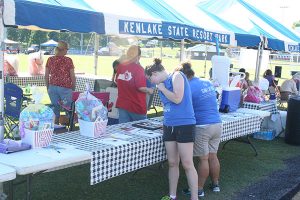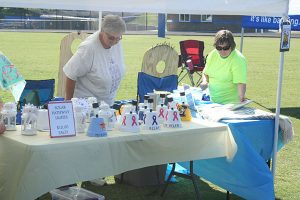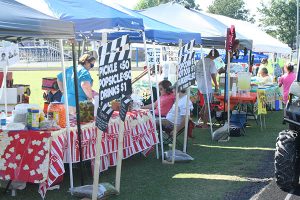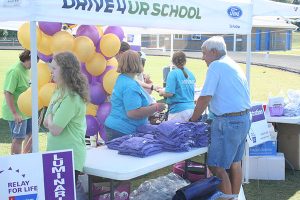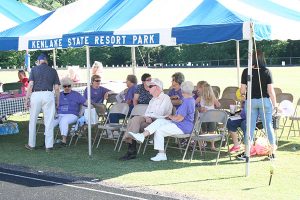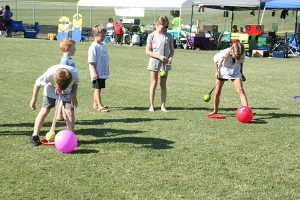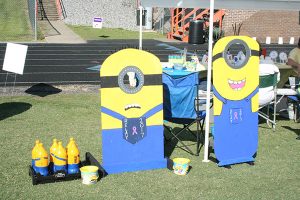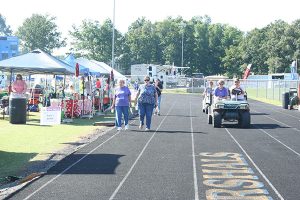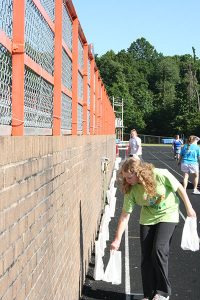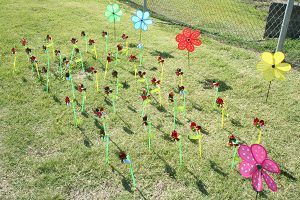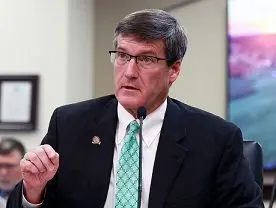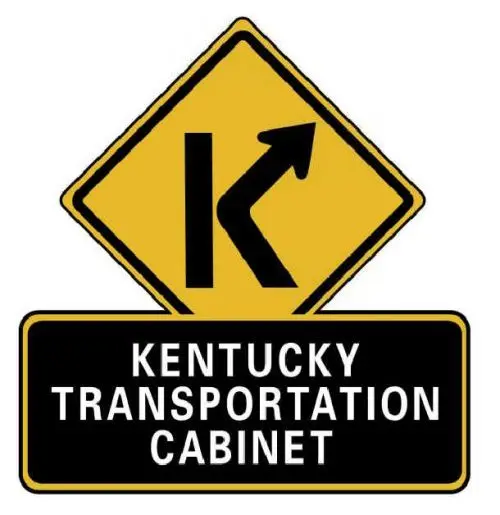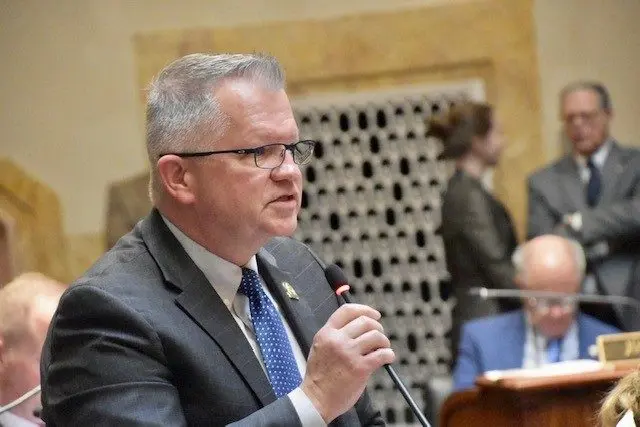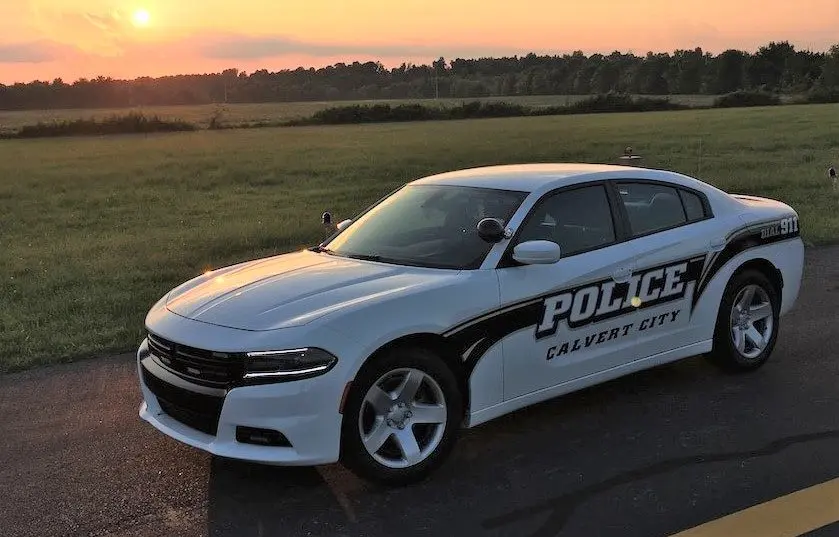Marshall County Relay for Life celebrated its 20th year in the county, but participation numbers have declined considerably from previous years.
Relay Committee Chairwoman Karen Powell said the annual event had seen a steady decrease in the number of teams and community participants in recent years, despite ongoing efforts to engage the public. Last year, 25 teams participated in the event, raising about $96,000 overall, Powell said. The 2017 event saw just 15 teams sign up to take part; as of Saturday, fundraising totals were nearing $70,000 of the committee’s $94,000 goal. Final totals, including luminary sales, were not available as of Monday.
It’s a concern not unique to Marshall County. Powell said many communities were experiencing the drop in participation.
“We’re trying different things, trying to get more teams involved and stuff, (but) I don’t know, we just can’t get a lot of people involved,” Powell said. “I think every county is having that issue. A lot of the counties are having that issue – everywhere. … It’s been going (on) for years.”
Powell said local church participation in mission trips, which often coincided with Relay, had affected participation numbers somewhat. Relay for Life typically falls in early to mid-June.
“That’s just the way it goes,” she said. “You can’t fault them for doing mission trips.”
Relay for Life began as an all-night event, invoking the belief that “Cancer doesn’t sleep, neither do we.” However, Powell said as participation waned, communities began to scale back events. About three years ago, Marshall County joined the list of those that concluded Relay late in the evening rather than overnight.
“People just stopped – by midnight they were gone,” she said. “Nobody was staying. Other counties were cutting it back, so we just decided there was no sense in us trying to stay when all that was here was the committee and a couple, two teams.”
Despite the drop, Powell said she was pleased with those teams and participants dedicated to the cause.
“We’re doing really good,” she said. “I think we were up to like $60,000 after bank night. So, no more teams than we’ve got, our teams are working really hard. They’re working really hard this year.”
She said she was also grateful for local youth who had stepped in to assist with event set up: the Marshall County Dance Team and the local Girl Scouts.
It’s work that strikes a chord with Powell, who got involved with Relay after her nephew was diagnosed with cancer at age 10 and survived. Powell said Relay served a critical role, not only in raising funds for research but also in giving people perspective.
“We try to make people stop and and think and show what people who have cancer go through,” she said. “… This is nothing compared to what they go through, because the struggle that they have, this is nothing compared to the treatments that they go through and how sick that they get and the pain that they have and everything. … This is just a time to come out and celebrate and remember what they go through.”
Like Powell, those teams dedicated to the effort have their reasons. Jeff Story has been working to raise funds with Friends-N-Kin, consistently a top earning team in the local Relay, since the team’s inception about 17 years ago. The team is famous for its barbecue, which members sell in a booth at the annual Barbecue on the River festival in Paducah as its largest Relay fundraising event. Friends-N-Kin also hosts a movie night, when members will rent Maiden Alley Theater to show a comedy and host a silent auction; proceeds from the event also go toward Relay.
It’s hard work, but for Story and fellow team members like Barbara Freeman, it’s worth it.
“Every one of us on our team has been touched by somebody that’s had cancer,” Story said. “And we’ve got people right now. … We’ve got several survivors on our team.”
Story said the team felt it was important to contribute to research, as well as help to raise funds for support services that help house families during a loved one’s treatments.
Friends-N-Kin had raised about $16,000 of its $20,000 goal as of Friday. Story said the group had been unable to hold its movie night fundraiser, which would typically net enough to compensate for the gap.
It’s discouraging to some to see participation diminish. Freeman said she was sad to see numbers decline in recent years.
“Cancer has touched everyone,” Freeman said. “I don’t care if it’s friends or family, and it’s just a great cause. I get kind of aggravated because, used to, you couldn’t get a place in this ballfield.”
The dedicated members remain, however, and for survivors like Deidra York, it means the world. York has been an active participant in Relay for the last 11 years, since her own struggle with uteran cancer. While she has no team and doesn’t sit on the committee, she said she makes it a point to come and offer her assistance wherever needed and to continue fighting, though her own battle with the disease was concluded.
It’s a battle she said no one should have to fight alone. York was in her 50s when she began experiencing unusual bleeding. She visited her doctor, who ran a series of tests that came back normal. York said typically, he might have sent her home, unconcerned about her symptoms, but a gut feeling and an abundance of caution told him to take a biopsy.
“My doctor, according to him, it was a miracle,” York said. “Because he did a biopsy and he said the odds of him hitting the exact spot that the tumor was, was just unreal. And he hit it on the first try. … He said it was about the size of a pencil eraser.
“… Another thing he told me, he said, ‘You are so fortunate that you came immediately, because I have another patient who this went on for a year, and she didn’t come.’ And he said, ‘by the time she came, there was nothing I could do.’ … And I truly believe God was watching over me and guiding that doctor, because I wouldn’t be here today.”
She was among the fortunate, she said. Doctors were able to perform a hysterectomy to eliminate the threat. The disease had been in its early stages, and thus she did not have to undergo chemotherapy or radiation. Since then, she said she urges people to be diligent in their prescreeing measures and to stay informed.
It was a life-altering episode for York, who had been unaware of what Relay for Life actually entailed until her own diagnosis. Now, she values the support it provides and feels that network is critical to those who have faced the disease.
“Basically, it means people care,” she said. “That there’s somebody out there that’s got your back, and trying to make a difference and trying to get some sort of research going that hopefully one day that word won’t even be in the vocabulary anymore.”
For more information about Relay for Life, visit ACS. To get involved in local Relay initiatives, call Powell at 270-252-6336.
